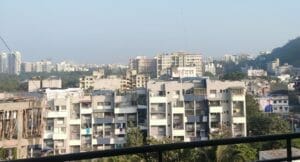On 3rd October, the State Cabinet approved a proposed amendment under the Maharashtra Apartment Ownership Act to forcibly evict tenants that opposed redevelopment.
The state has more than 1 lakh buildings that fall under the purview of this Act.
The proposal was submitted by a 15-member committee of the State Housing Federation. The committee was formed in 2020 by the state government under the then divisional joint registrar Jyoti Latkar-Mete. The proposal was finalised in 2021 and submitted to the state cooperation in April this year.
Once the amendment comes into force, members who refuse to vacate their flats for redevelopment in housing societies registered under the Maharashtra Apartment Ownership Act can be forcibly evicted.
Providing teeth to the 2018 amendment
Activists say that in recent years, rules are continuously being amended to favour real estate developers. “Earlier the norm for consent in redevelopment projects was 70%. This has been reduced to 51%,” said Hussain Indorewala, a Mumbai-based urban researcher.
An amendment to the Act in July 2018, introduced chapter 6 (A). Under this section, buildings over 30 years old and in dilapidated states can give a proposal of redevelopment to the Association of Apartments registered under the act and clear the resolution by a majority of 51%.
However, the Act did not provide for any clear course and created ambiguity on what to do if people refuse redevelopment.
With the insertion of the new chapter 6B in the act as per the amendment, it will be mandatory for the apartment owners to vacate the building if the Association of Apartments clears a mandate for redevelopment as mentioned in section 6(A).
In case the apartment owner doesn’t vacate the premises on his own, then the society can move the authority like the Brihanmumbai Municipal Corporation or Thane Municipal Corporation. These authorities can evict the flat owner with the help of police.
Read More: Faith-full redevelopment: What’s in store for Bhendi Bazaar?
Redevelopment and rights of tenants
Usually, ‘redevelopment’ agreements are in favour of developers. Now, even if there is a legitimate reason to oppose , the tenants will not be able to.
“Even people who have legitimate grounds to object to the project or its specifics will be overruled. Now it will become easier for promoters to piece together a 51% majority through inducements and threats,” explained Hussain.
One of the vital aspects of Section 6(A) is that it talks about Redevelopment of Apartments. Now, redevelopment of a particular building can be carried out with the consent of majority apartment owners residing in the building.
However, it is pertinent to note that a building which has completed 30 years from the date of issuance of Completion Certificate by the respective Planning Authority or from the date of issuance of permission to occupy the building, whichever is early or if the concerned Planning Authority renders the building dangerous, unfit to reside or is likely to fall, then the Redevelopment of the building shall commence without delays.
The proposed section 6 (B) fortifies section 6 (A) by allowing eviction thus speeding up the process.

Redevelopment and urban planning
Redevelopment does seem like a lucrative option for Mumbai as families are getting bigger, and people want better and bigger homes, keeping in mind how expensive real estate in Mumbai is. He mentioned, “While redevelopment does appeal to people, the people’s say in the process should be expanded, not curtailed.”
Often, when buildings are being redeveloped, we increase the number of housing units densifying an area that may already be dense. But there needs to be other facilities such as open spaces, schools and hospitals that may not necessarily be provided. “This amendment just eases the possibility for redevelopment projects. But it is important to assess the current and future impacts of such wholesale urban renewal on neighbourhoods and on the city as a whole,” Hussain said.
Impact in Mumbai
On the other hand, advocate Vinod Sampat, a Mumbai-based property lawyer explained that this amendment will be more prevalent in Pune than in Mumbai as very few buildings in Mumbai are under the purview of this Act.
“We have more Co-operative Housing Societies than apartment ownerships in Mumbai,” said advocate Vinod. He opines that this may be a political stunt as this proposed amendment does not have much value for Mumbai. The changes should have been made to the Maharashtra Co-operative Society Act instead, he said.
Activists and legal experts are anticipating legal action, if the amendment is invoked to evict people from their buildings.